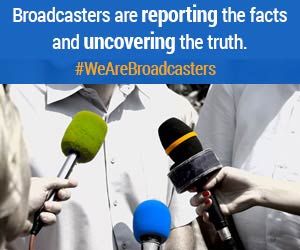
We supported the Commission’s proposal to exclude from any online public inspection file requirement the multitude of letters and emails that television stations receive from the public. We also expressed support for the Commission’s decision to offer to host the public inspection files on the FCC’s own website, but qualified our support by urging the Commission, as we did in earlier stages of the proceeding, to give stations the option of using the FCC’s website or its own website, with appropriate links to the FCC’s website, for their online public inspection files.
The State Associations did raise serious concerns however. We expressed great concern that the Commission’s apparent focus in the proceeding had changed, and inappropriately so, from the FCC’s longstanding emphasis on encouraging local dialogues between local residents and their local stations about their programming service to a new emphasis on oversight of television stations by non-local, and in fact, distant researchers and public advocacy groups that have no local ties to or personal knowledge of the individual communities served by local television stations.
We also registered our strong objection to the Commission’s proposal to require television stations to place their political files online, including forcing stations to catalogue the political file materials by “subfolders” and “subdivisions,” in effect to standardizing the management of traffic at television stations. We pointed out that there is no industry standard for managing traffic because many television stations use their own in-house trafficking software and many others use the products of at least fourteen outside vendors. In addition, we opposed the Commission’s proposal to expand substantially the types of “sponsors” that must be identified on the lists that stations have long been required to maintain in their public files. We argued that not only will each of these proposed new requirements be extraordinarily burdensome, they reflect a new “gotcha” regulatory attitude of the Commission with researchers, public advocacy groups and the Commission playing “stop watch” roulette if station political files go online or if the list of a television station’s “sponsors” must be expanded. Given that the base fines for violations of the FCC’s political file and public inspection file rules are $9,000 and $10,000, respectively, we pointed out that the FCC will have a strong incentive to encourage the filing of “stop watch” complaints as well as to make adverse “willful or repeated” findings notwithstanding the good faith efforts of broadcasters.
The State Associations urged the Commission not to adopt an online political file requirement or to expand the types of sponsorships that must be listed by television stations in their public inspection files. In the alternative, we suggested that the Commission defer a decision on whether to adopt an online political file requirement for television stations pending the outcome of its action with respect to replacing FCC Form 355. We also urged the Commission, if it still intends to adopt an online public inspection file requirement for television stations, to conduct a pilot program before finalizing any online public inspection file rule as well as provide a reasonable phase-in period for compliance. Furthermore, with the adoption of an online public inspection file requirement, we requested the Commission to remove as unnecessary the public file certification question from its application for renewal of broadcast licenses on FCC Form 303-S, as well as to reduce the base forfeiture amount for public inspection file violations which will become even more arbitrary and capricious in an online public file world.
Lastly, to acknowledge the high priority of dialogues between local viewers and local stations, the State Associations urged the Commission to require all persons and organizations having complaints about a station’s programming to certify, in any complaint, objection or petition filed with the Commission, that they have already made their concerns known, in writing or by email, to the affected station(s) and that they have not received either any response from the station(s) or a satisfactory response (along with the reasons why the response was not satisfactory) before the FCC will consider the matters contained in the person’s or organization’s complaint, objection or petition.


